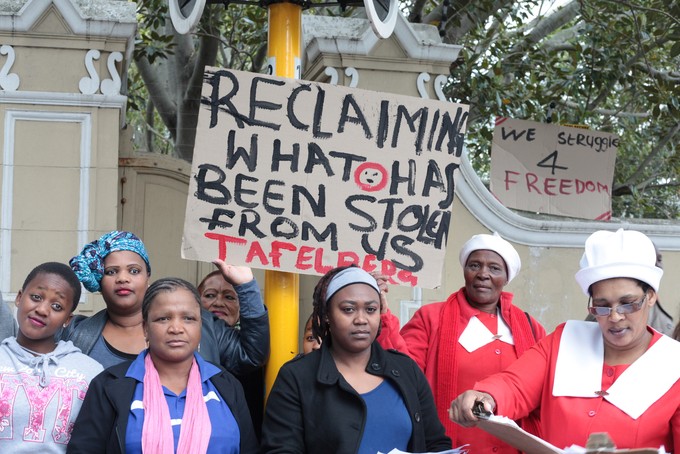Sea Point workers march against Tafelberg sale, as objection period ends
“We are sick and tired of the backyard” says domestic worker
Reclaim the City and about 100 of its supporters marched to the Tafelberg property in Sea Point on Thursday in opposition to the sale of the site.
Thursday marked the end of a 21-day public comment and objection period over the controversial sale of the site. The Western Cape Transport and Public Works Department is responsible for the Tafelberg property.
The Phyllis Jowell Jewish Day School originally bought the property from the province, but the sale was stopped following an agreement reached in May between lawyers for activist organisation Ndifuna Ukwazi (NU) and the provincial government after NU took the provincial government to court in April to interdict the sale.
Reclaim the City said at the time that the province had failed in the sale to comply with the Western Cape Land Administration Act, which requires that the Premier publish notice of the proposed sale and provide 21 days for public comment. A public hearing organised by NU was also held on 4 June for residents to voice concerns about the sale.
Reclaim the City garnered over 930 written submissions and 4,290 petition signatures from Cape Town residents who objected to the proposed sale. These documents will be handed to the offices of Public Works.
“This is how it should be: government must encourage and accept the participation of ordinary people in decisions of public interest and importance,” Reclaim the City wrote in a press release.
“We have experienced racism and resistance from wealthy people in Sea Point and our city who refuse to accept that working class, black people also have a right to stay in beautiful and well-located areas.”
The provincial cabinet will decide within 30 days whether the sale should continue.
Participants at the march spoke out at the event.
Songo Tinise goes to Thandokhulu High School in Mowbray, but lives in Philippi. In order to arrive at school on time, she must wake up at 4:30am to catch a 6am bus. Sometimes she is late for school.
“We as learners are also suffering. You’re probably asking yourself, ‘Why don’t you go to the schools that are in the townships?’ … Those schools are also not safe. They have poor infrastructures and safety problems, so that’s why most of us decided to come to the schools here in the city,” she said.
The commute takes away time that could be spent with her family, she said. “It’s not only the workers in Sea Point that are suffering,” she said.
Elizabeth Gqoboka has been living in Sea Point for 22 years and is a domestic worker. She said it is a “shame” to live in Sea Point as a black person. “We are like back squatters in Sea Point,” she said.
“We are sick and tired to be squashed in the backyard living with the rats,” she said. At night when she opens her door, rats run over her feet.
Gqoboka said she is in Sea Point to stay.
Support independent journalism
Donate using Payfast

Don't miss out on the latest news
We respect your privacy, and promise we won't spam you.
Next: More than laws needed to change hateful attitudes
Previous: Court orders Home Affairs to renew asylum seekers’ documents
© 2016 GroundUp. 
This article is licensed under a Creative Commons Attribution-NoDerivatives 4.0 International License.
You may republish this article, so long as you credit the authors and GroundUp, and do not change the text. Please include a link back to the original article.

